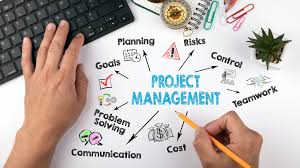Description
Project Management Training Course Outline Module 1: Introduction to Project Management- Overview of Project Management: Definition, importance, and key concepts.
- Project Life Cycle: Phases of a project from initiation to closure.
- Roles and Responsibilities: Key roles in project management (e.g., project manager, team members, stakeholders).
- Project Charter: Developing a project charter and defining project objectives.
- Stakeholder Identification: Identifying and analyzing stakeholders.
- Feasibility Study: Conducting feasibility studies and business case analysis.
- Scope Management: Defining and managing project scope.
- Work Breakdown Structure (WBS): Creating a WBS to organize project tasks.
- Schedule Management: Developing project schedules using tools like Gantt charts and critical path method (CPM).
- Cost Management: Estimating project costs and budgeting.
- Resource Management: Planning and allocating resources effectively.
- Risk Management: Identifying, analyzing, and planning for project risks.
- Communication Plan: Developing a communication plan to ensure effective stakeholder communication.
- Team Management: Building and managing project teams.
- Quality Management: Ensuring project deliverables meet quality standards.
- Procurement Management: Managing procurement processes and vendor relationships.
- Change Management: Handling changes in project scope, schedule, and resources.
- Performance Measurement: Using key performance indicators (KPIs) to track project progress.
- Earned Value Management (EVM): Applying EVM techniques to measure project performance.
- Issue and Risk Management: Monitoring and controlling project issues and risks.
- Reporting: Creating status reports and dashboards to communicate project progress.
- Closing Processes: Completing project deliverables and obtaining stakeholder acceptance.
- Lessons Learned: Conducting post-project reviews and documenting lessons learned.
- Project Handover: Transitioning project deliverables to operations or the client.
- Project Management Software: Overview of popular project management tools (e.g., Microsoft Project, Trello, Asana).
- Agile and Scrum: Introduction to Agile methodologies and Scrum framework.
- Lean and Six Sigma: Applying Lean and Six Sigma principles to project management.
- Leadership and Team Building: Developing leadership skills and building effective teams.
- Communication Skills: Enhancing communication and presentation skills.
- Conflict Resolution: Managing and resolving conflicts within the project team.
- Real-World Case Studies: Analyzing successful and unsuccessful projects.
- Hands-On Projects: Applying project management concepts to real-world scenarios.
- Group Work: Collaborating with peers on project simulations.
- Project Planning and Scheduling
- Developing Project Plans: Creating detailed project plans, including timelines, milestones, and deliverables.
- Resource Allocation: Assigning resources effectively to ensure project tasks are completed on time.
- Stakeholder Engagement
- Stakeholder Meetings: Conducting regular meetings with stakeholders to gather requirements and provide updates.
- Communication Management: Ensuring clear and consistent communication with all project stakeholders.
- Risk Management
- Risk Identification: Identifying potential risks that could impact the project.
- Risk Mitigation: Developing strategies to mitigate identified risks and minimize their impact.
- Budget Management
- Cost Estimation: Estimating project costs and creating budgets.
- Financial Tracking: Monitoring expenditures and ensuring the project stays within budget.
- Quality Assurance
- Quality Planning: Defining quality standards and criteria for project deliverables.
- Quality Control: Conducting inspections and tests to ensure deliverables meet quality standards.
- Team Leadership and Collaboration
- Team Building: Building and managing effective project teams.
- Conflict Resolution: Addressing and resolving conflicts within the project team.
- Monitoring and Controlling
- Performance Tracking: Using key performance indicators (KPIs) to track project progress.
- Change Management: Managing changes to project scope, schedule, and resources.
- Documentation and Reporting
- Project Documentation: Maintaining comprehensive project documentation, including plans, reports, and logs.
- Status Reporting: Providing regular status reports to stakeholders and project sponsors.
- Hands-On Project Execution
- Task Management: Overseeing the execution of project tasks and activities.
- Problem-Solving: Addressing issues and challenges that arise during project execution.
- Project Closure
- Final Deliverables: Ensuring all project deliverables are completed and meet the required standards.
- Lessons Learned: Conducting post-project reviews to document lessons learned and best practices.





Reviews
There are no reviews yet.